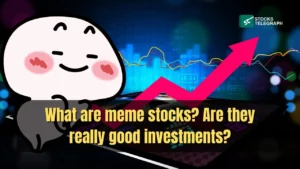The term “meme stock” is not uncommon these days for keen stock market followers. If you are unsure of what a meme stock is, allow us to explain to you what it is: it is a stock that goes viral through online propagation, causing a short squeeze in its price.
In a process of a short squeeze, a stock is heavily shorted following a piece of sudden positive news or a catalyst that brings in lots of new buyers. Short sellers are now forced to cover their positions (getting squeezed out), resulting in more buying, thus causing the stock to surge quickly and significantly.
Meme stocks have grown in popularity over the past few years. The soaring share price of GameStop (GME) in January 2021 became a highly publicized event. Users of WallStreetBets have picked up GME stock after hedge funds disclosed they are shorting it.
Online discussion forums and social media platforms are usually responsible for meme stock’s price rise, rather than factors like production growth. The value of these stocks typically increases rapidly, so they become overvalued.
So, how good are they for investment
In most cases, meme stocks aren’t a good investment option; they are better classified as growth or value stocks, as their price volatility and hype may not correspond with realistic valuations.
For instance, In recent times, there are several meme stocks to choose from, such as GameStop, AMC, and BlackBerry. After being mentioned on a popular Reddit forum, all three stocks shot up at price despite their poor performance in recent years. AMC stock jumped almost tenfold in value, while BlackBerry stock rose almost three times. However, neither of them achieved the same level of viral success as GameStop, which raised hundreds of dollars over a few days.
What made these Meme Stocks so popular?
The popularity of meme stocks is usually fueled by social media conversations. Their prices tend to spike more frequently in relation to internet virality. Reddit’s WallStreetBets forum recently contributed to the spikes in meme stocks prices.
In the recent 12 months, people stayed home following the pandemic, which resulted in significant layoffs. Besides all this free time, online platforms such as Robinhood and Webull have made investing more attractive. For retail investors, the marketplace was more widely accessible than ever before.
Collectively, all these factors boosted meme stock popularity.
Now let’s examine what creates meme crazes
Because of the growth of retail investing in meme stocks, the concept has become increasingly relevant recently. Individual stock trading is now easier than ever, which means more people are taking part in this meme stock bursts. These artificial spikes are not really connected to the actual performances of the companies, sharp nose dives usually follow them.
There are various phases in the meme stock cycle.
- To start with, Short squeezed or undervalued stocks are purchased in large quantities by investors as soon as they notice them. All eyes are drawn to the stock price as it gradually increases.
- At this point, investors have noticed a rise in volumes. As more individuals buy the stock, its price skyrockets.
- Instantly, the stock’s status flashes up on Facebook, Twitter, and online discussion boards.
- As a result, more retail investors are motivated to invest, leading to FOMO (fear of missing out).
- After early adopters sell their early versions for a profit, this type of trading comes to a dramatic end. People worry about losing money on the selling side of the transaction just as they did during the buying phase. This is when prices plummet even faster than they rose.
Who is the winner in Meme stock trading?
The early adopters are the ones who stand to benefit most from meme stock trading. It is normally too late to reap the benefits for anyone who gets involved during the FOMO phase. The influence of Reddit and Twitter over the market in the past few months is testimony to this.
Finally,
Meme’s stock definition can’t be as simple as easy as a growth or value stock, so categorizing it definitely would be slightly misleading. Meme stock impact is unlikely to be incorporated into textbooks soon, but to ignore it could prove very costly.










